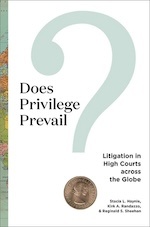Today, we are happy to bring you our conversation with Stacia L. Haynie, Kirk A. Randazzo, and Reginald S. Sheehan, authors Does Privilege Prevail? Litigation in High Courts across the Globe:
What inspired you to edit this book?
We were intrigued by Marc Galanter’s iconic assertion that the “haves” will always prevail in litigation outcomes. A number of robust datasets existed for the United States appellate courts that allowed scholars to empirically test Galanter’s hypothesis, but there was no comparable dataset for other high courts across the globe. The National Science Foundation supported building the dataset of over 15,000 decisions from 1970-2000 of the highest courts of appeal in Australia, Canada, India, the Philippines, South Africa and the United Kingdom. The dataset has been utilized by scholars to explore a number of topics, but our question remained enticingly unanswered. Thus, we set about studying who wins and loses in high courts across the globe to understand whether privilege prevails, and if so, under what conditions and if not, why.
What did you learn and what are you hoping readers will learn from your book?
We learned that the answer is complicated. In part, the status of the litigant matters. The empirical data indicates that the national government possesses a substantial advantage over other litigants. Individuals are often at a significant disadvantage because they appear before high courts only once. However, some litigants can offset a disadvantage through the expenditure of resources. For example, businesses that spend more money significantly increase their chances of winning. Finally, it is important to remember that the impact of these empirical results varies based on the law at issue (i.e. criminal, civil liberties, or economic) and the political, social, and economic contexts of the countries involved. This is why conducting a truly comparative analysis, with multiple countries, is essential.
What surprised you the most in the process of editing the book?
While we were aware of the interest in Galanter’s assertion that privilege prevails, we were surprised by the breadth and depth of those who shared our curiosity. It was fascinating to explore the scores of scholars who tested Galanter’s theory in a variety of settings. None, however, had done so for multiple countries over decades of time. Our empirical analyses confirmed many aspects of Galanter’s theory, but also provided additional nuances that had not been previously identified.
What’s your favorite anecdote from your book?
We include descriptions of cases pulled from the dataset. For South Africa, we include the South African Appellate Division’s decision in case of Omar and Others v Minister of Law and Order and Others 1987(3) 859 AD. The case involved Dullah Omar who had been detained under the worst of the apartheid detention regimes. Mr. Omar challenged his detention which deprived him of access to an attorney among other freedoms. As Galanter predicts, Mr. Omar lost his case. But over time, who is advantaged shifted and with the new democratic South Africa, Dullah Omar became the Minister of Justice responsible for administering justice in the whole of South Africa.
What’s next?
There are still so many questions to explore, and the National High Courts Database can bring data to bear in answering those questions. While our book explores the outcome in litigation outcomes, we are also interested in the individual voting behaviors of justices over time. Do their preferences for privilege persist or shift over time, and if so understanding why will expand our knowledge of high courts and their role, scope and function in sustaining rule of law.




